Search Results for 'earth'
-
AuthorSearch Results
-
July 5, 2023 at 8:21 pm #7263
In reply to: Family Stories From The Other Side ~ Book Two
Solomon Stubbs
1781-1857
Solomon was born in Hamstall Ridware, Staffordshire, parents Samuel Stubbs and Rebecca Wood. (see The Hamstall Ridware Connection chapter)
Solomon married Phillis Lomas at St Modwen’s in Burton on Trent on 30th May 1815. Phillis was the llegitimate daughter of Frances Lomas. No father was named on the baptism on the 17th January 1787 in Sutton on the Hill, Derbyshire, and the entry on the baptism register states that she was illegitimate. Phillis’s mother Frances married Daniel Fox in 1790 in Sutton on the Hill. Unfortunately this means that it’s impossible to find my 5X great grandfather on this side of the family.
Solomon and Phillis had four daughters, the last died in infancy.
Sarah 1816-1867, Mary (my 3X great grandmother) 1819-1880, Phillis 1823-1905, and Maria 1825-1826.Solomon Stubbs of Horninglow St is listed in the 1834 Whites Directory under “China, Glass, Etc Dlrs”. Next to his name is Joanna Warren (earthenware) High St. Joanna Warren is related to me on my maternal side. No doubt Solomon and Joanna knew each other, unaware that several generations later a marriage would take place, not locally but miles away, joining their families.
Solomon Stubbs is also listed in Whites Directory in 1831 and 1834 Burton on Trent as a land carrier:
“Land Carriers, from the Inns, Etc: Uttoxeter, Solomon Stubbs, Horninglow St, Mon. Wed. and Sat. 6 mng.”
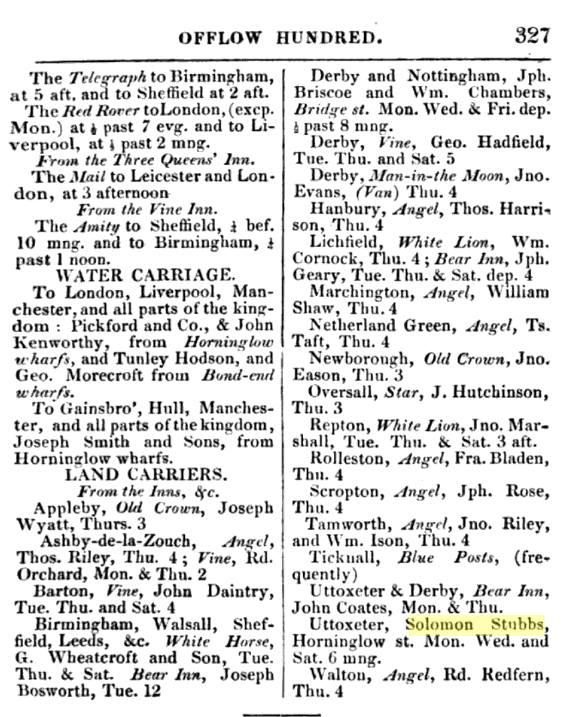
Solomon is listed in the electoral registers in 1837. The 1837 United Kingdom general election was triggered by the death of King William IV and produced the first Parliament of the reign of his successor, Queen Victoria.
National Archives:
“In 1832, Parliament passed a law that changed the British electoral system. It was known as the Great Reform Act, which basically gave the vote to middle class men, leaving working men disappointed.
The Reform Act became law in response to years of criticism of the electoral system from those outside and inside Parliament. Elections in Britain were neither fair nor representative. In order to vote, a person had to own property or pay certain taxes to qualify, which excluded most working class people.”Via the Burton on Trent History group:
“a very early image of High street and Horninglow street junction, where the original ‘ Bargates’ were in the days of the Abbey. ‘Gate’ is the Saxon meaning Road, ‘Bar’ quite self explanatory, meant ‘to stop entrance’. There was another Bargate across Cat street (Station street), the Abbot had these constructed to regulate the Traders coming into town, in the days when the Abbey ran things. In the photo you can see the Posts on the corner, designed to stop Carts and Carriages mounting the Pavement. Only three Posts remain today and they are Listed.”
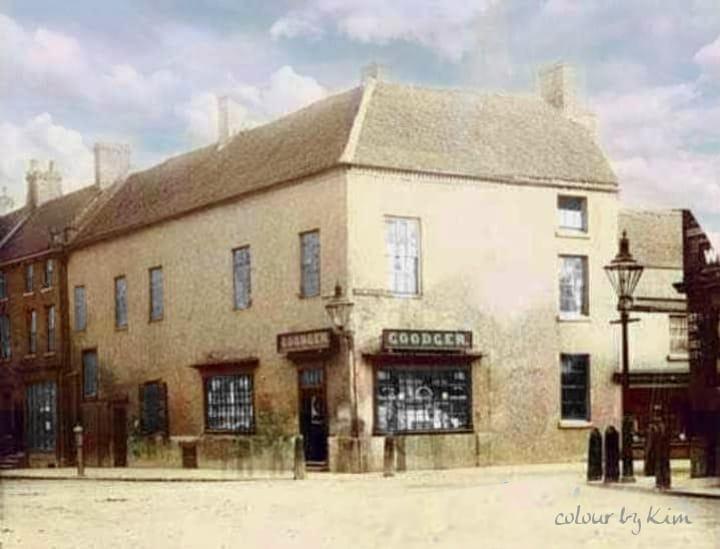
On the 1841 census, Solomon’s occupation was Carrier. Daughter Sarah is still living at home, and Sarah Grattidge, 13 years old, lives with them. Solomon’s daughter Mary had married William Grattidge in 1839.
Solomon Stubbs of Horninglow Street, Burton on Trent, is listed as an Earthenware Dealer in the 1842 Pigot’s Directory of Staffordshire.
In May 1844 Solomon’s wife Phillis died. In July 1844 daughter Sarah married Thomas Brandon in Burton on Trent. It was noted in the newspaper announcement that this was the first wedding to take place at the Holy Trinity church.
Solomon married Charlotte Bell by licence the following year in 1845. She was considerably younger than him, born in 1824. On the marriage certificate Solomon’s occupation is potter. It seems that he had the earthenware business as well as the land carrier business, in addition to owning a number of properties.
The marriage of Solomon Stubbs and Charlotte Bell:
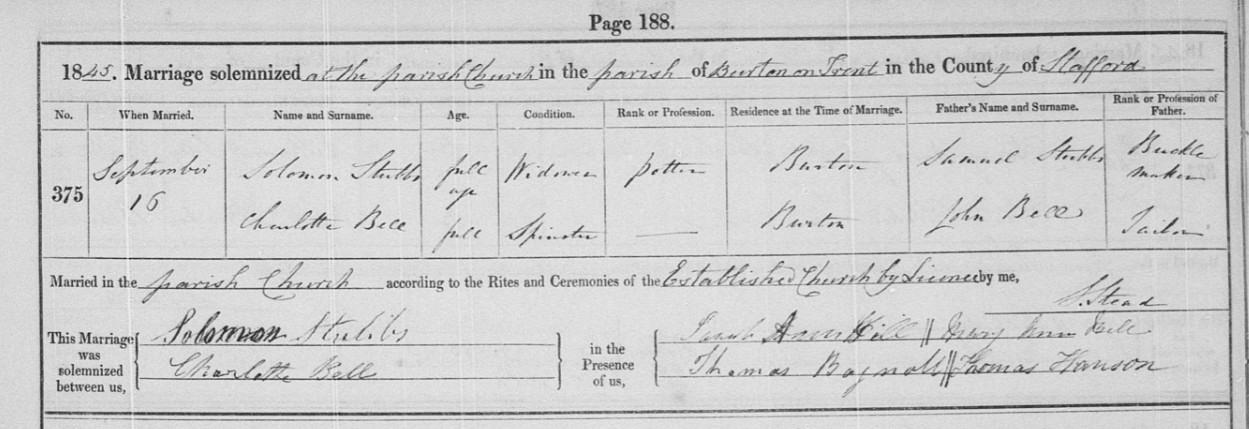
Also in 1845, Solomon’s daughter Phillis was married in Burton on Trent to John Devitt, son of CD Devitt, Esq, formerly of the General Post Office Dublin.
Solomon Stubbs died in September 1857 in Burton on Trent. In the Staffordshire Advertiser on Saturday 3 October 1857:
“On the 22nd ultimo, suddenly, much respected, Solomon Stubbs, of Guild-street, Burton-on-Trent, aged 74 years.”
In the Staffordshire Advertiser, 24th October 1857, the auction of the property of Solomon Stubbs was announced:
“BURTON ON TRENT, on Thursday, the 29th day of October, 1857, at six o’clock in the evening, subject to conditions then to be produced:— Lot I—All those four DWELLING HOUSES, with the Gardens and Outbuildings thereto belonging, situate in Stanleystreet, on Goose Moor, in Burton-on-Trent aforesaid, the property of the late Mr. Solomon Stubbs, and in the respective occupations of Mr. Moreland, Mr. Scattergood, Mr. Gough, and Mr. Antony…..”
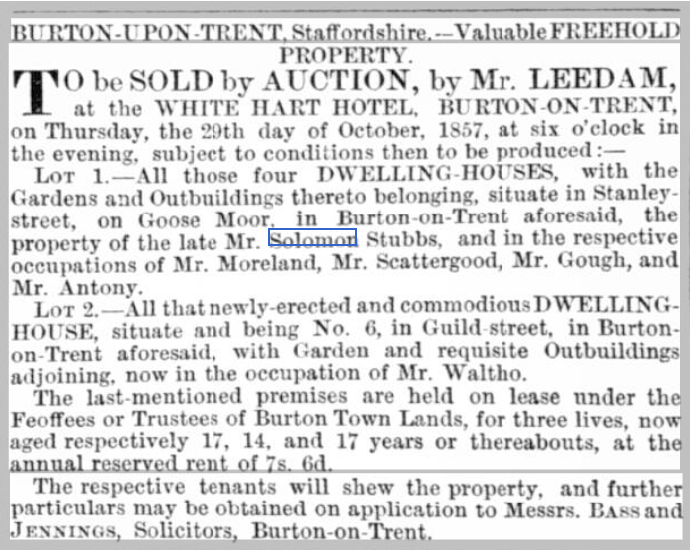
Sadly, the graves of Solomon, his wife Phillis, and their infant daughter Maria have since been removed and are listed in the UK Records of the Removal of Graves and Tombstones 1601-2007.
June 21, 2023 at 7:08 am #7259In reply to: The Precious Life and Rambles of Liz Tattler
A sudden and violent storm had cut off the manor from the outside world. Torrents of water had gushed over the roads and washed them out as if some manic god of cleanliness had decided to remove all the dust from the country, carrying away every other thing in its frenzied smudging. It had left the property an island, and the worse was they had no more electricity and no cable. Liz counted the days.
When they ran out of candles, they had to take the exercise bike back out of the cellar. Godfrey, who seemed to always know the most random, but always useful, things, had plugged it into the electric network, and voilà. Finnley had been the fiercest at the start because all the dust seemed to have taken refuge in the Manor. But once she had vented out all her frustration, it remained on Roberto’s and Godfrey’s legs to supply them with the essential power so that they could use the microwave to warm up the canned beans.
To Roberto’s dismay, the storm had washed away all the box trees he had so carefully tended to all those years. To Liz’ delight, the rain had accelerated the dig and unearthed what appeared to be a temple dedicated to some armless goddess. There was just one tiny problem, half the ruins were underwater.
The guests started to arrive for the Roman Delights Party in an enormous galley two weeks in advance, and the invitation hadn’t been printed yet. Roberto tied a rope to a mooring post and the guests started to disembark as if arriving to some movie award festival.
“There must be someone moving all those roams,” said Liz thoughtful to no one and everyone in particular. “They could take turns and relieve us at the bike.”
“Us?” asked Godfrey, raising an eyebrow.
“Tsst. Don’t be so cliché.”
She put on her smile as Walter Melon was approaching dressed like a Roman senator.
Sailors carrying crates invaded the kitchen. Finnley frowned at their muddy feet trampling all the floors she just cleaned.
“What’s in those?” she asked briskly.
“Food and trinkets for the banquet, I reckon,” said a tanned man with a tattoo on his neck saying Everything start with pixie dust.
Finnley rolled her eyes. “Follow me, I’ll show you the cellar.”
“Where do we put the octopuses tanks?”
March 31, 2023 at 8:00 pm #7221In reply to: Orbs of Madjourneys
Zara took the notebook to the door of the hut where there was more light. The notebook fell open in the middle. A poem was written:
In the dry and dusty Outback land,
Where once gold was king and gold was grand,
Now a new treasure has taken hold,
A precious resource worth more than gold.
It flows beneath the sun-baked ground,
And in its depths, a fortune’s found,
For golfers come from far and wide,
To play on greens that should have died.
The mines that once lay abandoned and still,
Now hold the key to this water’s thrill,
For deep within their shadowed halls,
The liquid flows and never stalls.
But this is no natural spring,
The water here is a stolen thing,
Drilled and pumped with greedy hands,
To feed the golf course’s demands.
And so the land is left to bake,
While the greens stay lush and never break,
A crime against the thirsty earth,
A selfish act of financial worth.
For water is the lifeblood of this place,
A scarce resource that they should embrace,
Instead, they steal and hoard and sell,
A priceless gem, a living well.
So let us remember,
as we play and roam,
That water is not a thing to own,
But a gift from nature, pure and true,
That we must cherish and protect anew.
Golf! Zara wasn’t expecting that! As she closed the notebook she noticed a green pool had appeared just outside the hut, which had not been there before she found the poem. Pool! Water! Those green pools of water!
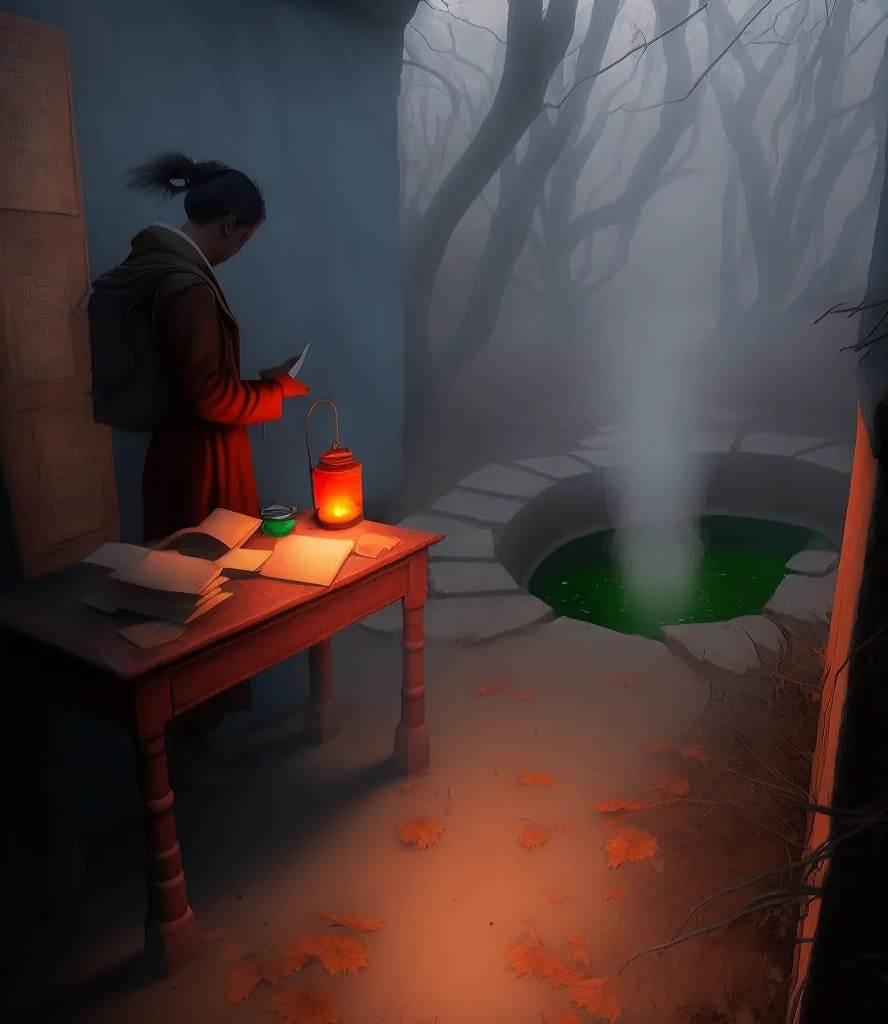
Zara almost dived headlong into the pool, and then remembered this was a group exercise and that she really ought to find out where the others were and share her finds with them.
March 19, 2023 at 5:49 pm #7173In reply to: Orbs of Madjourneys
The morning of the lager and cart race dawned bright and clear. The camping ground was full to overflowing with tents and camper vans, with several parked up outside the Flying Fish Inn. Zara overheard Finly complaining to Mater about all the extra work with all and sundry traipsing in and out using the toilets, and Bert muttering about where was all the extra water supposed to come from and what if the well ran dry, and was it all really worth it, and Zara saw him scowl when Idle told him to lighten up and enjoy it. “Hah! Enjoy it? Nothing good ever happens when a dust storm comes for the cart race,” he said pointedly to Idle, ” And damn near everyone asking about the old mines, I tell you, nothing good’s gonna come from a cart race in a dust storm, the mayor shoulda cancelled it.” Bert slammed the porch door as he stomped off outside, scowling at Zara on the way past.
Zara watched him go with a quizzical expression. What was going on here? Idle had told her about her affair with Howard some forty years ago, and how she’d had to disappear as soon as it became obvious that she was pregnant. Zara had sympathized and said what an ordeal it must have been, but Idle had laughed and said no not really, she’d had a lovely time in Fiji and had found a nice place to leave the baby. Then Howard had disappeared down the mines, and what was the story about Idle’s brother leaving mysteriously? Idle had been vague about that part, preferring to change the topic to Youssef. Was the Howard story why Bert was so reluctant for anyone to go down the mines? What on earth was going on?
And how had Yasmin’s parcel ended up in Xavier’s room? Xavi had soon noticed that he’d picked it up by mistake and returned it to Yasmin, but how had it ended up on the table on the verandah? It was perplexing, and made Yasmin disinclined to deliver it to Mater until she could fathom what had happened. She had tucked in under her mattress until she was sure what to do.
But that wasn’t the only thing that had piqued Zara’s curiosity. When Idle had said she’d had the baby in Fiji, and found a nice place to leave it, Zara couldn’t help but think of the orphanage where Yasmin was working. But no, surely that would be too much of a coincidence, and anyway, a 40 year old orphan wouldn’t still be there. But what about that woman in the BMW that Yasmin felt sure she recognized? No, surely it was all too pat. But then, what was that woman in the dark glasses doing in Betsy’s shop? Betsy was Howards wife. Idle had mentioned her when she told her story over the second bottle of wine.
Should she divulge Idle’s secrets to Yasmin and quiz her on the woman in dark glasses? Zara decided there would be no harm in it, after all, they would be leaving soon after the cart race, and what would it matter. She fetched two cups of coffee from the kitchen and took them to Yasmin’s room and knocked gently on the door.
“Are you awake?” she called softly.
“Yeah, come in Zara, I’ve been awake for ages,” Yasmin replied.
Zara put the coffee cups on the bedside table and sat on the side of Yasmins bed. “There’s something going on here, I have to tell you something. But first, have you worked out who that woman in the BMW is?”
Yasmin looked startled and said “How did you know? Yes I have. It’s Sister Finli from the orphanage, I’m sure of it. But why has she followed me here? And in disguise! It’s just creepy!”
“Aha!” Zara couldn’t suppress a rather triumphant smile. “I thought it was just a wacky idea, but listen to this, Idle told me something the other night when we sat up drinking wine.” As she told Idle’s story, Yasmin’s eyes widened and she put a hand over her open mouth.
“Could it be…?”
“Yes but why in disguise? What is she up to? What should we do, should we warn Idle?” Zara had warmed to Idle, and if there were any sides to be taken in the matter, she felt more for Idle than that unpleasant woman from the orphanage who was so disturbing to Yasmin.
“Oh I don’t know, maybe we should keep out of it!” Yasmin said. “That parcel though! What am I going to do about that parcel!”
Zara frowned. “Well, you have three options, Yas. Open it and read it… don’t look so horrified! Or deliver it as promised..”
“We’ll never know what it said though if we do that,” Yasmin was looking more relaxed now.
“Exactly, and I’m just too curious now.”
“And the third option?”
Ignoring the question, Zara asked where the parcel was. Yasmin grinned wickedly but a knock at the door interrupted her intention to retrieve the parcel from under the mattress. It was Youssef, who asked if he could come in.
“Shall we tell him?” Zara whispered, as Yasmin called out “Of course! Is Idle after you again? Quick, you can hide under my bed!”
“Not yet” Yasmin whispered back. “I need to think.”
March 7, 2023 at 8:20 pm #6774In reply to: Stories: New Found Pages
As they trekked through the endless dunes, Lord Gustard could barely contain his excitement. The thought of discovering the bones of the legendary giant filled him with a childlike wonder, and he eagerly scanned the horizon for any sign of their destination. As the fearless leader of the group, he had a deep-seated passion for adventure and exploration, a love for pith helmets. However, his tendency to get lost in his own thoughts at the most inconvenient times could sometimes get him in tricky situations. Despite this, he has an unshakable determination to succeed and a deep respect for the cultures and traditions of the places he visits.
Lady Floribunda, on the other hand, was the picture of patience and duty. She knew that this journey was important to her husband and she supported him unwaveringly, even as she silently longed for the comforts of home. Her first passion was for gossips and the life of socialites —but there was hardly any gossip material in the desert, so she fell back to her second passion, botany, that would often get her lost in her own world, examining and cataloging the scant flora and fauna they encountered on their journey. It wasn’t unusual to hear her at time talking to plants as if they were her dolls or children.
Cranky, meanwhile, couldn’t help but roll her eyes at Lord Gustard’s exuberance. “I swear, if I have to listen to one more of his whimsical ramblings, I’ll go mad,” she muttered to herself. Her tendency to grumble about the hardships of their journey had taken a turn for the worse, considering the lack of comfort from the past nights. She was as sharp-tongued as she was pragmatic, with a love for tea and crumpets that bordered on obsessive. Despite her grumpiness, she has a heart of gold and a deep affection for her companions, and especially young Illi.
Illi, on the other hand, was thrilled by every new discovery along the way. Whether it was a curious beetle scuttling across the sand or a shimmering oasis in the distance, she couldn’t help but express her excitement with a constant stream of questions and exclamations. Illi was a bright and enthusiastic young girl, with a passion for adventure and a wide-eyed wonder at the world around her. She had a tendency to burst into song at the most unexpected moments.
Tibn Zig and Tanlil Ubt remained loyal and steadfast, shrugging off any incongruous spur of the moment extravagant outburst from Gustard. Their experience in the desert had taught them to stay calm and focused, no matter what obstacles they might encounter. But behind the stoic façade, they had a penchant for telling tall tales and playing practical jokes on their companions. Their mischievousness was however only for good fun, and they had become fiercely loyal to Lord Gustard after he’d rescued them from sand bandits who were planning to sell them as slave. Needless to say, they would have done whatever it takes to keep the Fergusson family safe.
Illi was hoping for eccentric traders and desert nomads to fortune-seeking treasure hunters and conniving bandits, but for miles it was just plain unending desert. The worst they found on their path were unending sand dunes, a few minuscule deadly scorpions, and mostly contending with the harsh desert sun beating down upon them. Finally, after days of wandering through the desert, they reached their destination.
As they approached Tsnit n’Agger, the landscape began to change. The sand dunes gave way to rocky cliffs and towering red sandstone formations, and the air grew cooler and more refreshing. The group pressed on, their spirits renewed by the prospect of discovering the secrets of the legendary giant’s bones.
At last, they arrived at the entrance to the giant’s cave. Lord Gustard led the way, his torch casting flickering shadows on the walls as they descended deeper into the earth. The air grew colder and damper, and the sounds of dripping water echoed around them.
As they turned a corner, they suddenly found themselves face to face with the giant’s bones. Towering above them, the massive skeletal structure filled the cavern from floor to ceiling. The sight of the giant’s bones towering above them was awe-inspiring, and Lord Gustard was practically bouncing with excitement. The group behind him was in awe, even Cranky, as they were taking in the enormity and majesty of the ancient creature.
Floribunda and Cranky exchanged a weary but amused look, while Illi gazed up at the bones with wide-eyed wonder.
“Let’s get to work,” Lord Gustard declared, his enthusiasm undimmed. And with that, they set to the task of uncovering the secrets of the legendary giant, each in their own way.
March 5, 2023 at 11:17 pm #6772In reply to: The Journey of Franiel, Background
Ghört, the winds that blow,
Whispering secrets we may never know.
Nærvel, the waters that flow,
Carrying stories of lands below.Agnima, the flames that dance,
Illuminating paths of chance.
Selvaniel, the woods that grow,
A sanctuary for both friend and foe.Margilonia, the earth that grounds,
Rooted in ancient, forgotten sounds.
Lejüs, the memories that fade,
Echoes of a lost world, where shadows played.On Duane, these six gods reign,
Their ancient language an eternal refrain.
As the days come and go,
Their voices in harmony, forever flow.March 1, 2023 at 7:29 pm #6737In reply to: The Jorid’s Travels – 14 years on
I hear the greenhouse airlock open. I don’t look up and keep my focus on the alien sweat pea plant I have been working on. I’m trying to get it to bind itself to the carbon mesh I printed to help it spread instead of grow like a ball. My hands are precise and my movement efficient. I’ve been practicing everyday since I embarked on this ship some fourteen years ago. I don’t allow distraction when I’m in the greenhouse, and Georges was often one.
He plants himself on my left.
“I found the beast,” he says.
“One moment. I’m almost done.”
I have to be careful with the tendrils. An abrupt gesture would cause them to wind around my fingers and pierce my lab gloves with their myriad of teeth. As sharp and poisonous as black mamba teeth, I’d be dead in seconds.
“Here, little thing. That’s good,” I say, encouraging the plant.
After the first three tendrils find their bearing on the carbon mesh, the rest of the plant follows.
“That’s gross,” Georges says. “I don’t know why you always pick the most dangerous ones.”
I don’t answer and observe the plant wraps its tendrils around the carbon wires like it found a prey. I spent weeks trying to find the right combination of softness and tension for the alien plant to accept it.
“I’m done,” I say.
I look up and I see the creature in Georges’ hands.
“Isn’t she cute?” Georges asks.
“She? Should I worry next time you tell me I’m cute?”
The creature’s cute, as much as a rodent with protruding eyes can be. It’s clearly neither from Earth, nor from Alienor. The eyes are looking straight at me and its muzzle wiggles as if getting some information through its sense of smell. It isn’t dangerous, since Georges is still alive. He’s the opposite of careful and after all those years together, I have to wonder how he’s still alive.
February 23, 2023 at 7:33 pm #6636In reply to: The Jorid’s Travels – 14 years on
Georges had always thought going out into space with the spacesuits generated by Jorid was an exhilarating experience. The tight fitting suit and gloves were full of sensors that could transmit different kind of sensory informations to the brain. Pressure, temperature and the fluctuations of the Boodenbaum surface field. It was a lot like feeling the surface tension of water and moving in space with these suits was as easy as swimming in a warm ocean.

The light of the star gave Georges’ white suit a green hue. There was no doubt they were back in the Alienor system after 14 years. The Jorid was currently orbiting Duane, not very far from there, Georges could see the twin planet, Murtuane. But no sign of Phrëal anywhere. His helmet speakers started playing “In the Hall of the Mountain King” by Edvard Grieg.
“Jorid,” said Georges, “what are you doing?”
“I thought it was fitting for such a grandiose moment, Georges. The sensory information about your body tells me you’re filled with nostalgia and awe at the sight of your home planet.”
“It’s not my… forget it. What am I looking for?”
“Likely a small creature, the size of a rodent from Earth. I can fell it run about the greenhouse where Salomé is taking care of her sweet pea plants from planet Attalyi. It seems to have developed an interest in her activities.”
Georges glided over the curved hull toward the giant window Jorid had manifested for Salomé’s little experiments. She wanted to grow alien vegetation in an intersticial environment kept in stasis in between dimensions to spice up the dishes from the replicator. He hid behind one of Jorid’s spherical gravitational wave sensor.
“I can see the creature. Is Salomé aware it’s spying on her?”
“Negative. She required not being disturbed during her experiments.”
Georges pushed a button on his wrist keyboard. Beethoven’s fifth symphony started playing. Georges pushed the same button again. The track changed to Mozart’s “Little Night” music.
“Jorid, the wristboard is malfunctioning. Can you stop the music and activate the cloaking shield for me ?”
“Negative. The creature is creating of interferences.”
“How? Wow!? What the …”
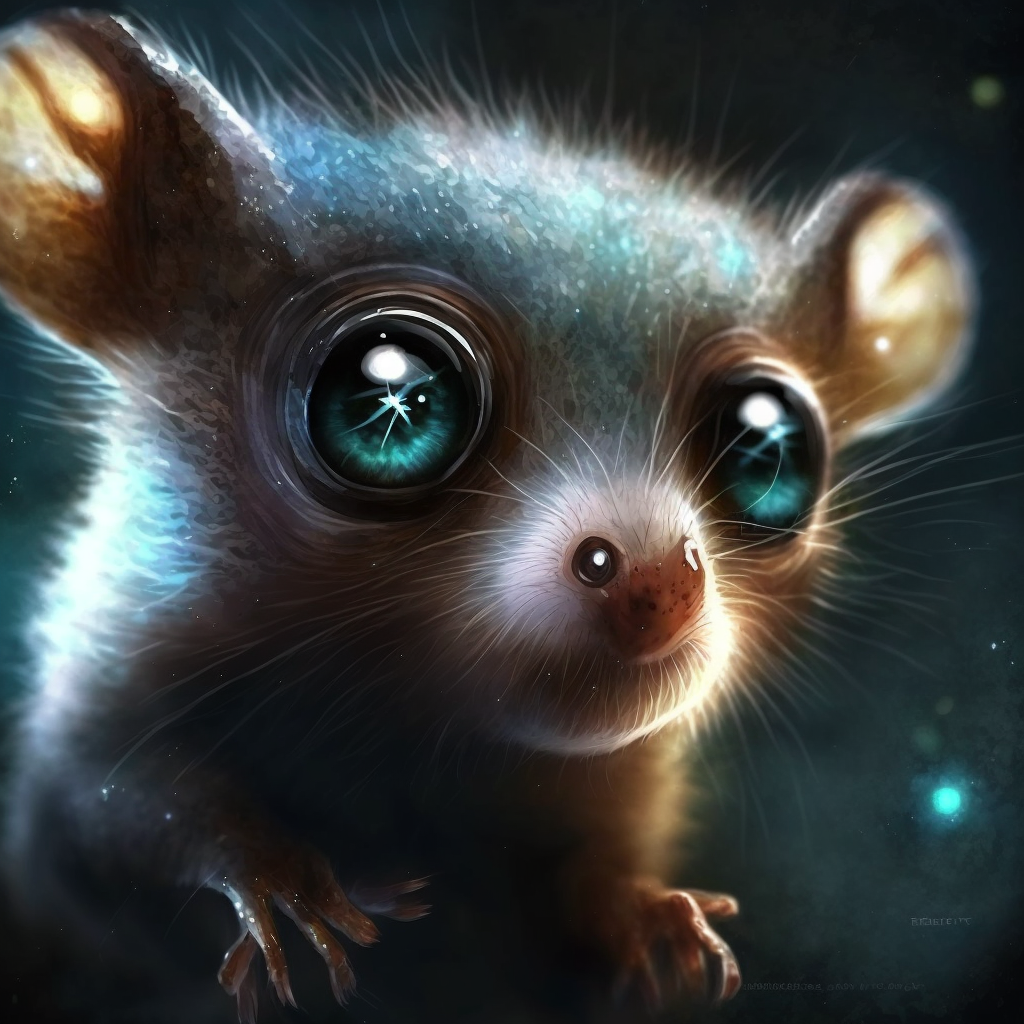
A creature the size of a marmoset had landed on Georges helmet and was licking the glass, using its gecko fingers to stick it. An image formed into Georges mind : Salomé stroking the creature in the green house and calling it Sand’Rin.
“I think she likes you,” said Jorid.
February 7, 2023 at 6:20 pm #6506In reply to: Orbs of Madjourneys
Bert dropped Zara off after breakfast at the start of the Yeperenye trail. He suggested that she phone him when she wanted him to pick her up, and asked if she was sure she had enough water and reminded her, not for the first time, not to wander off the trail. Of course not, she replied blithely, as if she’d never wandered off before.
“It’s a beautiful gorge, you’ll like it,” he called through the open window, “You’ll need the bug spray when you get to the water holes.” Zara smiled and waved as the car roared off in a cloud of dust.
On the short drive to the start of the trail, Bert had told her that the trail was named after the Yeperenye dreamtime, also known as ‘Caterpillar Dreaming’ and that it was a significant dreamtime story in Aboriginal mythology. Be sure to look at the aboriginal rock art, he’d said. He mentioned several varieties of birds but Zara quickly forgot the names of them.
It felt good to be outside, completely alone in the vast landscape with the bone warming sun. To her surprise, she hadn’t seen the parrot again after the encounter at the bedroom window, although she had heard a squalky laugh coming from a room upstairs as she passed the staircase on her way to the dining room.
But it was nice to be on her own. She walked slowly, appreciating the silence and the scenery. Acacia and eucalyptus trees were dotted about and long grasses whispered in the occasional gentle breezes. Birds twittered and screeched and she heard a few rustlings in the undergrowth from time to time as she strolled along.
After a while the rocky outcrops towered above her on each side of the path and the gorge narrowed, the trail winding through stands of trees and open grassland. Zara was glad of the shade as the sun rose higher.
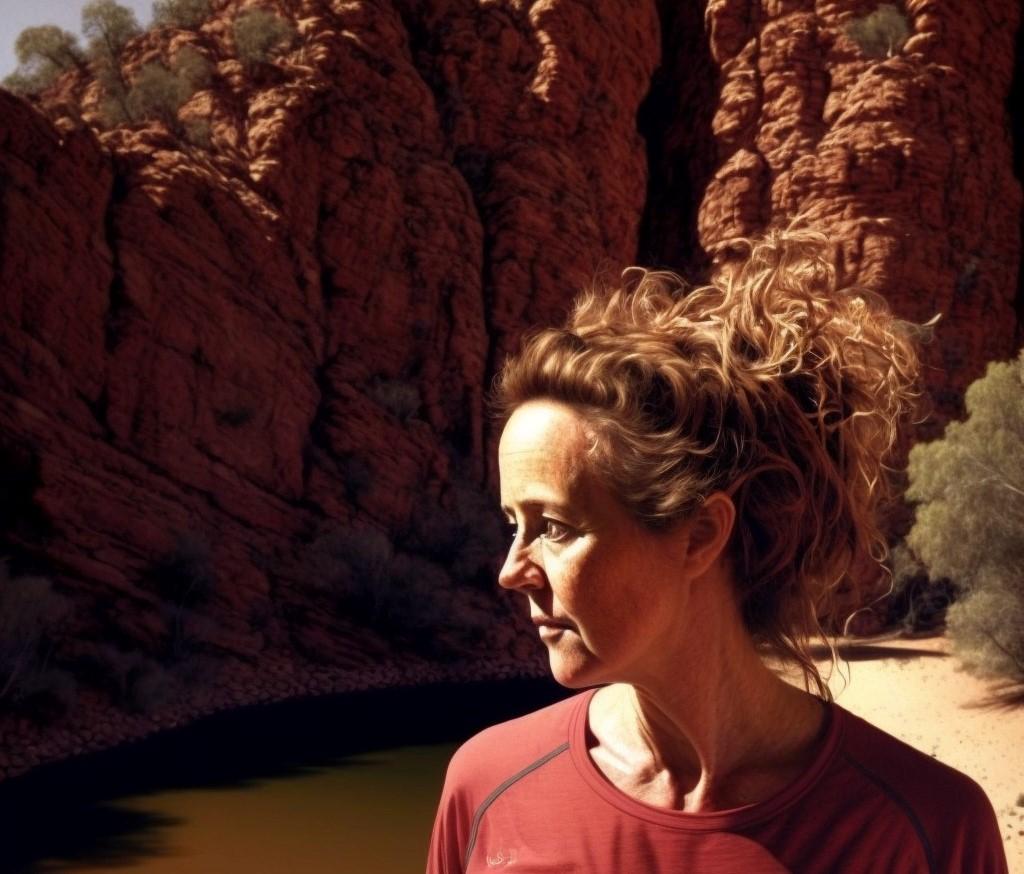
The first water hole she came to took Zara by surprise. She expected it to be pretty and scenic, like the photos she’d seen, but the spectacular beauty of the setting and shimmering light somehow seemed timeless and otherwordly. It was a moment or two before she realized she wasn’t alone.
It was time to stop for a drink and the sandwich that one of the twins had made for her, and this was the perfect spot, but she wondered if the man would find it intrusive of her to plonk herself down and picnic at the same place as him. Had he come here for the solitude and would he resent her appearance?
It is a public trail, she reminded herself not to be silly, but still, she felt uneasy. The man hadn’t even glanced up as far as Zara could tell. Had he noticed her?
She found a smooth rock to sit on under a tree and unwrapped her lunch, glancing up from time to time ready to give a cheery wave and shout hi, if he looked up from what he was doing. But he didn’t look up, and what exactly was he doing? It was hard to say, he was pacing around on the opposite side of the pool, looking intently at the ground.
When Zara finished her drink, she went behind a bush for a pee, making sure she would not be seen if the man glanced up. When she emerged, the man was gone. Zara walked slowly around the water hole, taking photos, and keeping an eye out for the man, but he was nowhere to be seen. When she reached the place where he’d been pacing looking at the ground, she paused and retraced his steps. Something small and shiny glinted in the sun catching her eye. It was a compass, a gold compass, and quite an unusual one.
Zara didn’t know what to do, had the man been looking for it? Should she return it to him? But who was he and where did he go? She decided there was no point in leaving it here, so she put it in her pocket. Perhaps she could ask at the inn if there was a lost and found place or something.
Refreshed from the break, Zara continued her walk. She took the compass out and looked at it, wondering not for the first time how on earth anyone used one to find their way. She fiddled with it, and the needle kept pointing in the same direction. What good is it knowing which way north is, if you don’t know where you are anyway? she wondered.
With a squalk and a beating of wings, Pretty Girl appeared, seemingly out of nowhere. “It’s not that kind of compass. You’re supposed to follow the pointer.”
“Am I? But it’s pointing off the trail, and Bert said don’t go off the trail.”
“That’s because Bert doesn’t want you to find it,” replied the parrot.
Intrigued, Zara set off in the direction the compass was pointing towards.
February 7, 2023 at 2:18 pm #6505In reply to: The Chronicles of the Flying Fish Inn
I told Devan in no ambiguous terms to solve his own funny riddle.
I did try to make an effort, but that seemed a rather desperate way to catch our attention after not really caring about the family for so long.
It was good to see him though.With all the activity around the coming guests at the Inn, it’s easy getting lost in the wind of activities, like the motes of dust hiding in Dido’s hair.
The twins did a good effort though, with all the decorating and stuff. I was sincerely impressed. Been a long time since I’ve been impressed by them. Seems they may actually grow up fine. Who would have known really.Hormonal growth be damned, I’m feeling all sort of contradictory feelings about this.
Like, what about hearing about our funny father after all this time.
And Devan, who’d shut us all off, now back for a little make-over time… Or something else maybe. He doesn’t seem to realize the emotional landscape and baggage here. He’s a nice brother though.
It’s horrible. So much contradiction – I feel some rage on the surface, lots of… and underneath so much caring it’s painful.
So what happened to our father? Still alive? Quite possibly. I’ve had my suspicious when this strange guy posed as a friend to the twins on the social network some years back.
I was young when he left without a note; hadn’t started to write my journals yet, so my memories of him are very little. But I remember the chaos left after him; Mater wasn’t really the same after. I think she’s burned all pictures of him, and somehow pretends they never existed.
Idle plays it as if she doesn’t care, but I’m sure she does. She doesn’t want to let it be known, but she probably doesn’t want to hurt Mater more with this.God, what a family drama. Why would Devan want to unearth all of this now, at a moment we were all quiet and settled like a decent respectable family.
It was maybe just keeping up with appearances, and the veneer was thin to start with.
That’s in the middle of all this angst mixed with puberty that it hit me.
Acrostic. Or ἀκροστιχίς in Greek. First verse, or first letter.
My dad was a writer, so he liked word riddles. And the little sign was a pointer.
>A mine, a tile, dust piled high,
Together they rest, yet always outside.
One misstep, and you’ll surely fall,
Into the depths, where danger lies all.ATOI didn’t seem to make much sense, but I remembered how small “l” sometimes looked like a capital “I”.
Atoll was the clue I’m sure of it. Where to disappear if not to islands.
The letters at the end of the verses are spelling HELL. So it’s opposite.Basically, Atoll Paradise.
A little Gugu search with AI, and that was it. That was our father here, with a number to call.
Atoll Paradise
Boat rentals – Island tours
Copywriter, biographer
Call FRED @ (+679) 215-7644Now it’ll be fair if Devan is calling me crazy. We’ll have to call and check before saying anything to Idle or even Mater for now.
February 6, 2023 at 10:36 pm #6499Premise is set:
Olga, Egbert and Obadiah are key protagonists in an adventure of elderly people being evicted / escaping their nursing home of Oocrane (with Maryechka, Obadiah’s grand-daughter, in tow). They start traveling together and helping each other in a war-torn country, and as they travel, they connect with other characters.
Tone is light-hearted and warm, with at times some bitter-sweet irony, and it unfolds into a surprisingly enthralling saga, with some down-to-earth mysteries, adding up to a satisfying open-ended conclusion that brings some deep life learning about healing the past, accepting the present and living life to its potential.A potential plot structure begins to develop henceforth:
Chapter 2: The Journey Begins
Departure from the Nursing Home
Olga and Egbert make their way out the front gate with Obadiah, who has decided to join them on their journey, and they set out on the road together.
Maryechka, Obadiah’s granddaughter, decides to come along as well out of concern about the elders’, and the group sets off towards an unknown destination.A Stop at the Market
The group stops at a bustling market in the town and begins to gather supplies for their journey.
Olga and Egbert haggle with vendors over prices, while Obadiah and Maryechka explore the market and gather food for the road.
The group encounters a strange man selling mysterious trinkets and potions, who tries to sell them a “luck” charm.An Unexpected Detour
The group encounters a roadblock on their path and are forced to take a detour through a dense forest.
They encounter a group of bandits on the road, who demand their supplies and valuables.
Olga, Egbert, and Obadiah band together to outwit the bandits and escape, while Maryechka uses her wits to distract them.A Close Call with a Wild Beast
The group comes across a dangerous wild animal on the road, who threatens to attack them.
Obadiah uses his quick thinking to distract the beast, while Egbert and Olga come up with a plan to trap it.
Maryechka uses her bravery to lure the beast into a trap, saving the group from certain danger.A Night Under the Stars
The group sets up camp for the night, exhausted from their journey so far.
They sit around a campfire, sharing stories and reminiscing about their pasts.
As they gaze up at the stars, they reflect on the challenges they have faced so far and the journey ahead of them. They go to bed, filled with hope and a sense of camaraderie, ready for whatever comes next.February 6, 2023 at 10:15 pm #6498Some background information on The Sexy Wooden Leg and potential plot developments.
Setting
(nearby Duckailingtown in Dumbass, Oocrane)
The Rootians (a fictitious nationality) invaded Oocrane (a fictitious country) under the guise of freeing the Dumbass region from Lazies. They burned crops and buildings, including the home of a man named Dumbass Voldomeer who was known for his wooden leg and carpenter skills. After the war, Voldomeer was hungry and saw a nest of swan eggs. He went back to his home, carved nine wooden eggs, and replaced the real eggs with the wooden ones so he could eat the eggs for food. The swans still appeared to be brooding on their eggs by the end of summer.Note: There seem to be a bird thematic at play.
The swans’ eggs introduce the plot. The mysterious virus is likely a swan flu. Town in Oocrane often have reminiscing tones of birds’ species.
Bird To(w)nes: (Oocrane/crane, Keav/kea, Spovlar/shoveler, Dilove/dove…)
Also the town’s nursing home/hotel’s name is Vyriy from a mythical place in Slavic mythology (also Iriy, Vyrai, or Irij) where “birds fly for winter and souls go after death” which is sometimes identified with paradise. It is believed that spring has come to Earth from Vyrai.At the Keav Headquarters
(🗺️ Capital of Oocrane)
General Rudechenko and Major Myroslava Kovalev are discussing the incapacitation of President Voldomeer who is suffering from a mysterious virus. The President had told Major Kovalev about a man in the Dumbass region who looked similar to him and could be used as a replacement. The Major volunteers to bring the man to the General, but the General fears it is a suicide mission. He grants her permission but orders his aide to ensure she gets lost behind enemy lines.
Myroslava, the ambitious Major goes undercover as a former war reporter, is now traveling on her own after leaving a group of journalists. She is being followed but tries to lose her pursuers by hunting and making fire in bombed areas. She is frustrated and curses her lack of alcohol.
The Shrine of the Flovlinden Tree
(🗺️ Shpovlar, geographical center of Oocrane)
Olek is the caretaker of the shrine of Saint Edigna and lives near the sacred linden tree. People have been flocking to the shrine due to the miraculous flow of oil from the tree. Olek had retired to this place after a long career, but now a pilgrim family has brought a message of a plan acceleration, which upsets Olek. He reflects on his life and the chaos of people always rushing around and preparing for the wrong things. He thinks about his father’s approach to life, which was carefree and resulted in the same ups and downs as others, but with less suffering. Olek may consider adopting this approach until he can find a way to hide from the enemy.
Rosa and the Cauldron Maker
(young Oocranian wiccan travelling to Innsbruck, Austria)
Eusebius Kazandis is selling black cauldrons at the summer fair of Innsbruck, Austria. He is watching Rosa, a woman selling massage oils, fragrant oils, and polishing oils. Rosa notices Eusebius is sad and thinks he is not where he needs to be. She waves at him, but he looks away as if caught doing something wrong. Rosa is on a journey across Europe, following the wind, and is hoping for a gust to tell her where to go next. However, the branches of the tree she is under remain still.
The Nursing Home
(Nearby the town of Dilove, Oocrane, on Roomhen border somewhere in Transcarpetya)
Egna, who has lived for almost a millennium, initially thinks the recent miracle at the Flovlinden Tree is just another con. She has performed many miracles in her life, but mostly goes unnoticed. She has a book full of records of the lives of many people she has tracked, and reminisces that she has a connection to the President Voldomeer. She decides to go and see the Flovlinden Tree for herself.
🗺️ (the Vyriy hotel at Dilove, Oocrane, on Roomhen border)
Ursula, the owner of a hotel on the outskirts of town, is experiencing a surge in business from the increased number of pilgrims visiting the linden tree. She plans to refurbish the hotel to charge more per night and plans to get a business loan from her nephew Boris, the bank manager. However, she must first evict the old residents of the hotel, which she is dreading. To avoid confrontation, she decides to send letters signed by a fake business manager.
Egbert Gofindlevsky, Olga Herringbonevsky and Obadiah Sproutwinklov are elderly residents of an old hotel turned nursing home who receive a letter informing them that they must leave. Egbert goes to see Obadiah about the letter, but finds a bad odor in his room and decides to see Olga instead.
Maryechka, Obadiah’s granddaughter, goes back home after getting medicine for her sick mother and finds her home empty. She decides to visit her grandfather and his friends at the old people’s home, since the schools are closed and she’s not interested in online activities.
Olga and Egbert have a conversation about their current situation and decide to leave the nursing home and visit Rosa, Olga’s distant relative. Maryechka encounters Egbert and Olga on the stairs and overhears them talking about leaving their friends behind. Olga realizes that it is important to hold onto their hearts and have faith in the kindness of strangers. They then go to see Obadiah, with Olga showing a burst of energy and Egbert with a weak smile.Thus starts their escape and unfolding adventure on the roads of war-torn Oocrane.
Character Keyword Characteristics Sentiment Egbert old man, sharp tone sad, fragile Maryechka Obadiah’s granddaughter, shy innocent Olga old woman, knobbly fingers conflicted, determined Obadiah stubborn as a mule, old friend of Egbert unyielding, possibly deaf February 2, 2023 at 8:09 am #6489In reply to: Orbs of Madjourneys
It was a pleasant 25 degrees as Zara stepped off the plane. The flat red land stretched as far as the eye could see, and although she prefered a more undulating terrain there was something awe inspiring about this vast landscape. It was quite a contrast from the past few hours spent inside mine tunnels.
Bert, a weatherbeaten man of indeterminate advanced age, was there to meet her as arranged and led her to the car, a battered old four wheel drive. Although clearly getting on in years, he was tall and spry and dressed in practical working clothes.
“Welcome to Alice,” he said, taking her bag and putting in on the back seat. “I expect you’ll be wanting to know a bit about the place.”
“How long have you lived here?” Zara asked, as Bert settled into the creaky drivers seat and started the car.
Bert gave her a funny look and replied “Longer than a ducks ass.” Zara had never heard that expression before; she assumed it meant a long time but didn’t like to pursue the question.
“All this land belongs to the Arrernte,” he said, pronouncing it Arrunda. “The local aboriginals. 1862 when we got here. Well,” Bert turned to give Zara a lopsided smile, “Not me personally, I aint quite that old.”
Zara chuckled politely as Bert continued, “It got kinda busy around these parts round 1887 with the gold.”
“Oh, are there mines near here?” Zara asked with some excitement.
Bert gave her a sharp look. “Oh there’s mines alright. Abandoned now though, and dangerous. Dangerous places, old mines. You’ll be more interested in the hiking trails than those old mines, some real nice hiking and rock gorges, and it’s a nice temperature this time of year.”
Bert lapsed into silence for a few minutes, frowning.
“If you’da been arriving back then, you’da been on a camel train, that’s how they did it back then. Camel trains. They do camel tours for tourists nowadays.”
“Do you get many tourists?”
“Too dang many tourists if you ask me, Alice is full of them, and Ayers Rock’s crawling with ’em these days. We don’t get many out our way though.” Bert snorted, reminding Zara of Yasmin. “Our visitors like an off the beaten track kind of holiday, know what I mean?” Bert gave Zara another sideways lopsided smile. “I reckon you’ll like it at The Flying Fish Inn. Down to earth, know what I mean? Down to earth and off the wall.” He laughed heartily at that and Zara wasn’t quite sure what to say, so she laughed too.
“Sounds great.”
“Family run, see, makes a difference. No fancy airs and graces, no traffic ~ well, not much of anything really, just beautiful scenery and peace and quiet. Aunt Idle thinks she’s in charge but me and old Mater do most of it, well Finly does most of it to be honest, and you dropped lucky coming now, the twins have just decorated the bedrooms. Real nice they look now, they fancied doing some dreamtime murials on the walls. The twins are Idle’s neices, Clove and Corrie, turned out nice girls, despite everything.”
“Despite ….?”
“What? Oh, living in the outback. Youngsters usually leave and head for the cities. Prune’s the youngest gal, she’s a real imp, that one, a real character. And Devan calls by regular to see Mater, he works at the gas station.”
“Are they all Idle’s neices and nephews? Where are their parents?” Perhaps she shouldn’t have asked, Zara thought when she saw Bert’s face.
“Long gone, mate, long since gone from round here. We’ve taken good care of ’em.” Bert turned off the road onto a dirt road. “Only another five minutes now. We’re outside the town a bit, but there aint much in town anyway. Population 79, our town. About right for a decent sized town if you ask me.”
Bert rounded a bend in a eucalyptus grove and announced, “Here we are, then, the Flying Fish Inn.” He parked the car and retrieved Zara’s bag from the back seat. “Take a seat on the verandah and I’ll find Idle to show you to your room and get you a drink. Oh, and don’t be put off by Idle’s appearance, she’s a sweetheart really.”
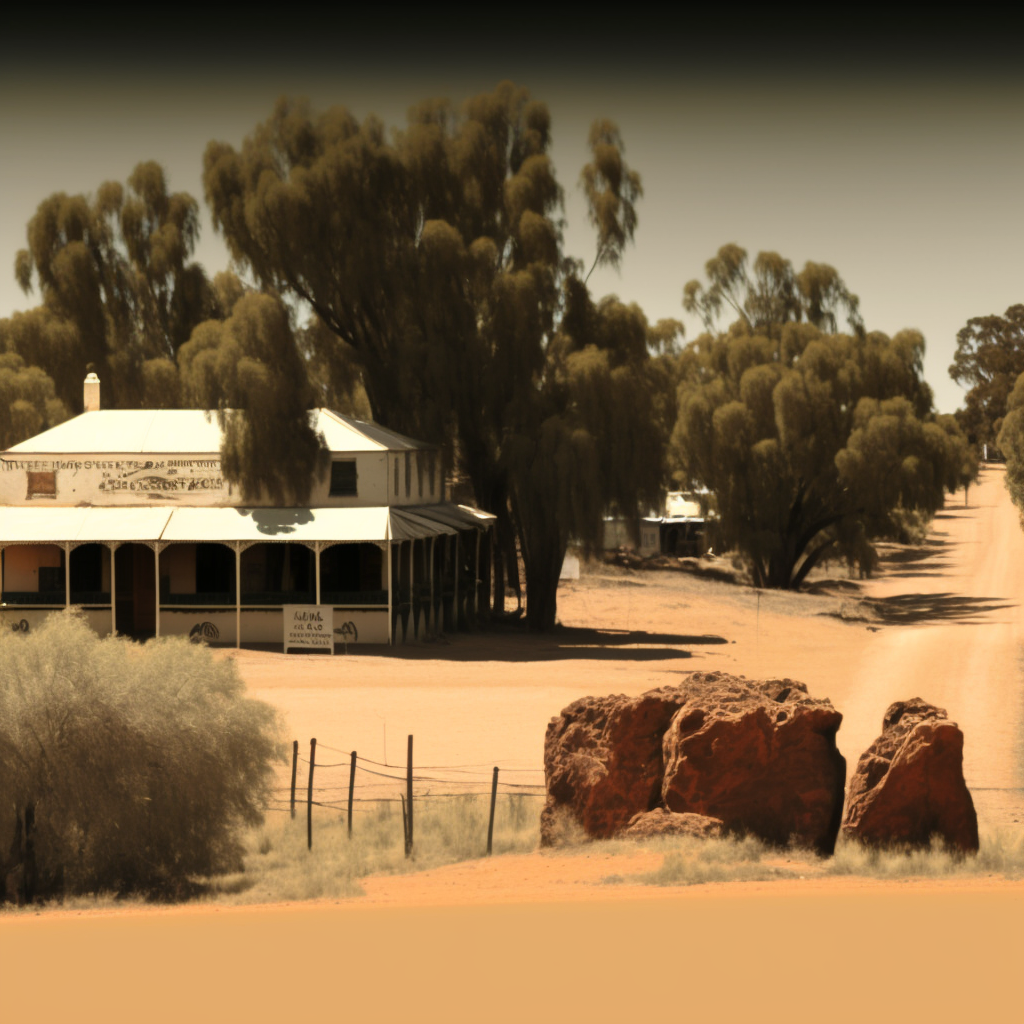
Aunt Idle was nowhere to be found though, having decided to go for a walk on impulse, quite forgetting the arrival of the first guest. She saw Bert’s car approaching the hotel from her vantage point on a low hill, which reminded her she should be getting back. It was a lovely evening and she didn’t rush.
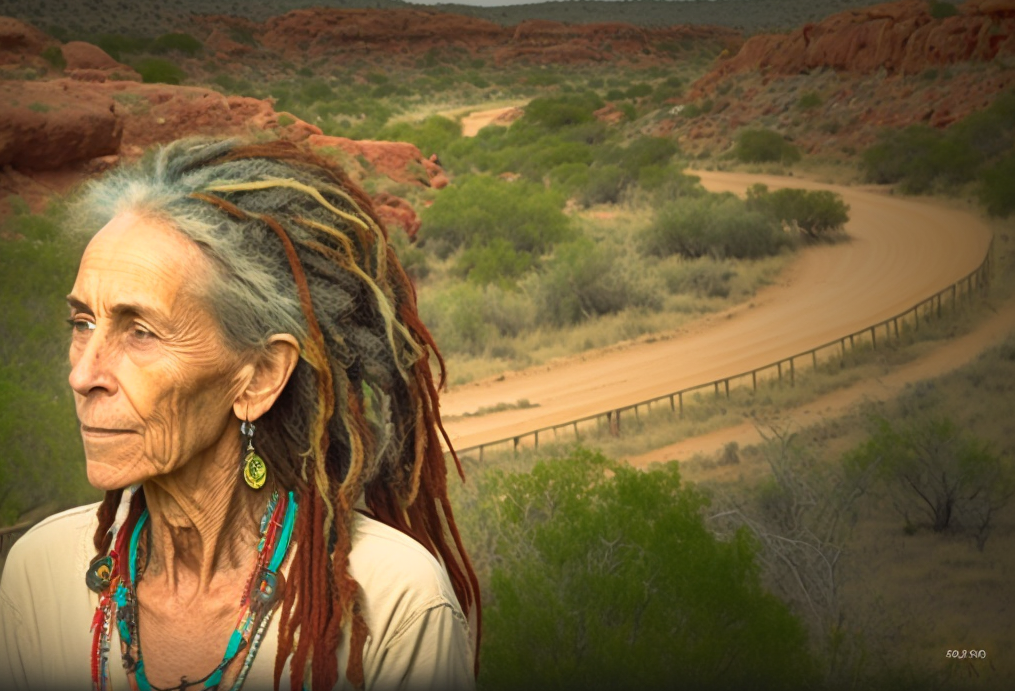
Bert found Mater in the dining room gazing out of the window. “Where the bloody hell is Idle? The guest’s outside on the verandah.”
“She’s taken herself off for a walk, can you believe it?” sighed Mater.
“Yep” Bert replied, “I can. Which room’s she in? Can you show her to her room?”
“Yes of course, Bert. Perhaps you’d see to getting a drink for her.”
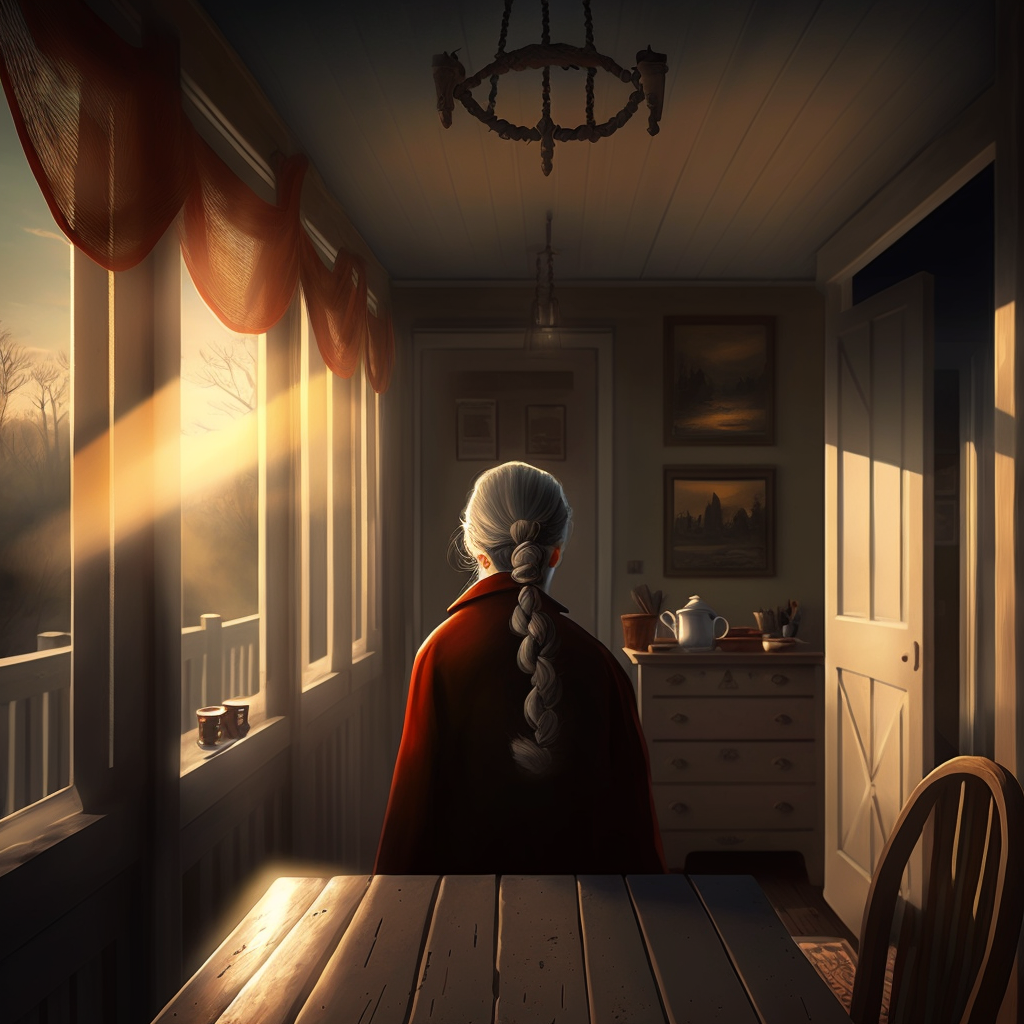 February 1, 2023 at 12:57 pm #6487
February 1, 2023 at 12:57 pm #6487In reply to: The Chronicles of the Flying Fish Inn
I’ve always felt like the odd one out in my family. Growing up at the Flying Fish Inn, I’ve always felt like I was on the outside looking in. My mother left when I was young, and my father disappeared not long after. I’ve always felt like I was the only one who didn’t fit in with the craziness of my family.
I’ve always tried to keep my distance with the others. I didn’t want to get too involved, take sides about petty things, like growing weed in the backyard, making psychedelic termite honey, or trying to influence the twins to buy proper clothes. But truth is, you can’t get too far away. Town’s too small. Family always get back to you, and manage to get you involved in their shit, one way or another, even if you don’t say anything. That’s how it works. They don’t need my participation to use me as an argument.
So I stopped paying attention, almost stopped caring. I lived my life working at the gas station, and drinking beers with my buddies Joe and Jasper, living in a semi-comatose state. I learned that word today when I came bringing little honey buns to mater. I know she secretly likes them, even if she pretend she doesn’t in front of Idle. But I can see the breadcrumbs on her cardigan when I come say hi at the end of the day. This morning, Idle was rocking in her favourite chair on the porch, looking at the clouds behind her mirrored sunglasses. Prune was talking to her, I saw she was angry because of the contraction of the muscles of her jaw and her eyes were darker than usual. She was saying to Idle that she was always in a semi-comatose state and doing nothing useful for the Inn when we had a bunch of tourists arriving. And something about the twins redecorating the rooms without proper design knowledge. Idle did what she usually does. She ignored the comment and kept on looking at the clouds. I’m not even sure she heard or understood that word that Prune said. Semi-comatose. It sounds like glucose. That’s how I’m spending my life between the Inn, the gas station and my buddies.
But things changed today when I got back to my apartment for lunch. You can call it a hunch or a coincidence. But as we talked with Joe about that time when my dad left, making me think we were doing hide and seek, and he left me a note saying he would be back someday. I don’t know why I felt the need to go search that note afterwards. So I went back to the apartment and opened the mailbox. Among the bills and ads, I found a postcard with a few words written on the image and nothing except my address on the back. I knew it was from my dad.
It was not signed or anything, but still I was sure it was his handwriting. I would recognise it anywhere. I went and took the shoebox I keep hidden on top of the kitchen closet, because I saw people do that in movies. That’s not very original, I know, but I’m not too bright either. I opened the box and took the note my dad left me when he disappeared.
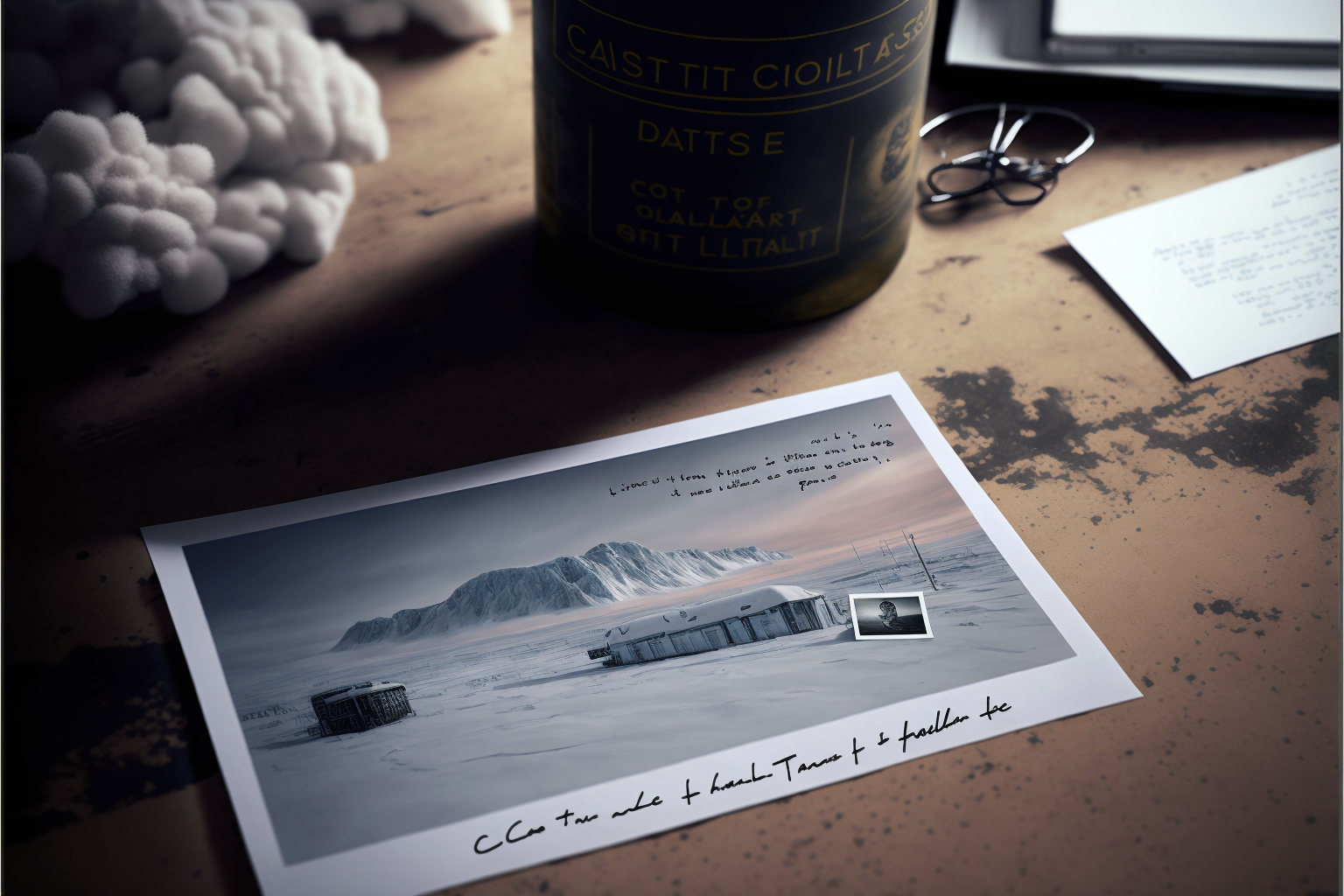 I put the card on the desk near the note. The handwritings matched. I felt so excited, and confused.
I put the card on the desk near the note. The handwritings matched. I felt so excited, and confused.A few words at the bottom of the card said : “Memories from the coldest place on Earth…”
Why would dad go to such a place to send me a postcard after all those years ? Just to say that.
That’s when I recalled what Prune had told me once as we were watching a detective movie : “Read everything with care and always double check your information.”
On the back, it said that the image was from a scientific station in Antartica, but the stamp indicated it had been posted from a floating post office in the North Pole. I turned the card and looked at the text again. Above the station, a few words were written that sounded like a riddle.
> A mine, a tile, dust piled high,
Together they rest, yet always outside.
One misstep, and you’ll surely fall,
Into the depths, where danger lies all.It sure sounds like a warning. But I’m not too good with riddles. No need to worry Mater about that, in case of false hope and all that. Idle ? Don’t even think about it. She won’t believe me when I say it’s from dad. She never does believe me. And she’ll keep playing with the words trying to find her answer in the shape of smoke. The twins, they are a riddle on their own.
No. It’s Prune’s help I need.
January 31, 2023 at 9:12 pm #6481In reply to: The Jorid’s Logs – 14 years on and more
This is the outline for a short novel called “The Jorid’s Travels – 14 years on” that will unfold in this thread.
The novel is about the travels of Georges and Salomé.
The Jorid is the name of the vessel that can travel through dimensions as well as time, within certain boundaries. The Jorid has been built and is operated by Georges and his companion Salomé.Short backstory for the main cast and secondary characters
Georges was a French thief possibly from the 1800s, turned other-dimensional explorer, and together with Salomé, a girl of mysterious origins who he first met in the Alienor dimension but believed to have origins in Northern India maybe Tibet from a distant past.
They have lived rich adventures together, and are deeply bound together, by love and mutual interests.
Georges, with his handsome face, dark hair and amber gaze, is a bit of a daredevil at times, curious and engaging with others. He is very interesting in anything that shines, strange mechanisms and generally the ways consciousness works in living matter.
Salomé, on the other hand is deeply intuitive, empath at times, quite logical and rational but also interested in mysticism, the ways of the Truth, and the “why” rather than the “how” of things.
The world of Alienor (a pale green sun under which twin planets originally orbited – Duane, Murtuane – with an additional third, Phreal, home planet of the Guardians, an alien race of builders with god-like powers) lived through cataclysmic changes, finished by the time this story is told.
The Jorid’s original prototype designed were crafted by Léonard, a mysterious figure, self-taught in the arts of dimensional magic in Alienor sects, acted as a mentor to Georges during his adventures. It is not known where he is now.
The story starts with Georges and Salomé looking for Léonard to adjust and calibrate the tiles navigational array of the Jorid, who seems to be affected by the auto-generated tiles which behave in too predictible fashion, instead of allowing for deeper explorations in the dimensions of space/time or dimensions of consciousness.
Leonard was last spotted in a desert in quadrant AVB 34-7•8 – Cosmic time triangulation congruent to 2023 AD Earth era. More precisely the sand deserts of Bluhm’Oxl in the Zathu sector.When they find Léonard, they are propelled in new adventures. They possibly encounter new companions, and some mystery to solve in a similar fashion to the Odyssey, or Robinsons Lost in Space.
Being able to tune into the probable quantum realities, the Jorid is able to trace the plot of their adventures even before they’ve been starting to unfold in no less than 33 chapters, giving them evocative titles.
Here are the 33 chapters for the glorious adventures with some keywords under each to give some hints to the daring adventurers.
- Chapter 1: The Search Begins – Georges and Salomé, Léonard, Zathu sector, Bluhm’Oxl, dimensional magic
- Chapter 2: A New Companion – unexpected ally, discovery, adventure
- Chapter 3: Into the Desert – Bluhm’Oxl, sand dunes, treacherous journey
- Chapter 4: The First Clue – search for Léonard, mystery, puzzle
- Chapter 5: The Oasis – rest, rekindling hope, unexpected danger
- Chapter 6: The Lost City – ancient civilization, artifacts, mystery
- Chapter 7: A Dangerous Encounter – hostile aliens, survival, bravery
- Chapter 8: A New Threat – ancient curse, ominous presence, danger
- Chapter 9: The Key to the Past – uncovering secrets, solving puzzles, unlocking power
- Chapter 10: The Guardian’s Temple – mystical portal, discovery, knowledge
- Chapter 11: The Celestial Map – space-time navigation, discovery, enlightenment
- Chapter 12: The First Step – journey through dimensions, bravery, adventure
- Chapter 13: The Cosmic Rift – strange anomalies, dangerous zones, exploration
- Chapter 14: A Surprising Discovery – unexpected allies, strange creatures, intrigue
- Chapter 15: The Memory Stones – ancient wisdom, unlock hidden knowledge, unlock the past
- Chapter 16: The Time Stream – navigating through time, adventure, danger
- Chapter 17: The Mirror Dimension – parallel world, alternate reality, discovery
- Chapter 18: A Distant Planet – alien world, strange cultures, exploration
- Chapter 19: The Starlight Forest – enchanted forest, secrets, danger
- Chapter 20: The Temple of the Mind – exploring consciousness, inner journey, enlightenment
- Chapter 21: The Sea of Souls – mystical ocean, hidden knowledge, inner peace
- Chapter 22: The Path of the Truth – search for meaning, self-discovery, enlightenment
- Chapter 23: The Cosmic Library – ancient knowledge, discovery, enlightenment
- Chapter 24: The Dream Plane – exploring the subconscious, self-discovery, enlightenment
- Chapter 25: The Shadow Realm – dark dimensions, fear, danger
- Chapter 26: The Fire Planet – intense heat, dangerous creatures, bravery
- Chapter 27: The Floating Islands – aerial adventure, strange creatures, discovery
- Chapter 28: The Crystal Caves – glittering beauty, hidden secrets, danger
- Chapter 29: The Eternal Night – unknown world, strange creatures, fear
- Chapter 30: The Lost Civilization – ancient ruins, mystery, adventure
- Chapter 31: The Vortex – intense energy, danger, bravery
- Chapter 32: The Cosmic Storm – weather extremes, danger, survival
- Chapter 33: The Return – reunion with Léonard, returning to the Jorid, new adventures.
January 31, 2023 at 11:58 am #6478In reply to: Orbs of Madjourneys
“One of them’s arriving early!” Aunt Idle told Mater who had just come swanning into the kitchen with her long grey hair neatly plaited and tied with a red velvet bow. Ridiculous being so particular about her hair at her age, Idle thought, whose own hair was an untidy and non too clean looking tangle of long dreadlocks with faded multicolour dyes growing out from her grey scalp. “Bert’s going to pick her up at seven.”
“You better get a move on then, the verandah needs sweeping and the dining room needs dusting. Are the bedrooms ready yet?” Mater replied, patting her hair and pulling her cardigan down neatly.
“Plenty of time, no need to worry!” Idle said, looking worried. “What on earth was that?” Something bright caught her eye through the kitchen window.
“Never mind that, make a start on the cleaning!” Mater said with a loud tut and an eye roll. Always getting distracted, that one, never finishes a job before she’s off sidetracking. Mater gave her hair another satisfied pat, and put two slices of bread in the toaster.
But Aunt Idle had gone outside to investigate. A minute or two later she returned, saying “You’ll never guess what, there’s a tame red parrot sitting on the porch table. And it talks!”
“So you’re planning to spend the day talking to a parrot, and leave me to do all the dusting, is that it?” Mater said, spreading honey on her toast.
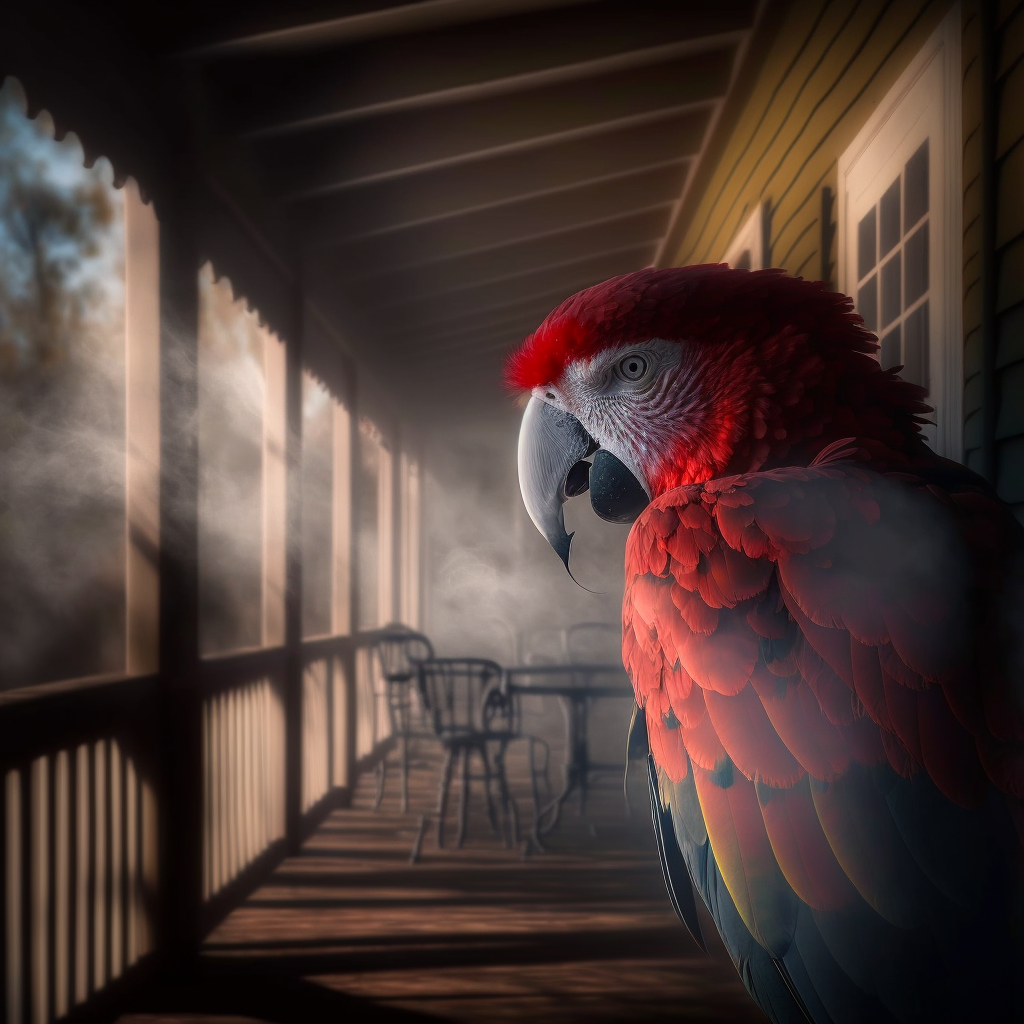 January 30, 2023 at 8:43 pm #6472
January 30, 2023 at 8:43 pm #6472In reply to: The Jorid’s Travels – 14 years on
Salomé: Using the new trans-dimensional array, Jorid, plot course to a new other-dimensional exploration
Georges (comments): “New realms of consciousness, extravagant creatures expected, dragons least of them!” He winked “May that be a warning for whoever wants to follow in our steps”.
The Jorid: Ready for departure.
Salomé: Plot coordinates quadrant AVB 34-7•8 – Cosmic time triangulation congruent to 2023 AD Earth era. Quantum drive engaged.
Jorid: Departure initiated. Entering interdimensional space. Standby for quantum leap.

Salomé (sighing): Please analyse subspace signatures, evidences of life forms in the quadrant.
Jorid: Scanning subspace signatures. Detecting multiple life forms in the AVB 34-7•8 quadrant. Further analysis required to determine intelligence and potential danger.
Salomé: Jorid, engage human interaction mode, with conversational capabilities and extrapolate please!
Jorid: Engaging human interaction mode. Ready for conversation. What would you like to know or discuss?
Georges: We currently have amassed quite a number of tiles. How many Salomé?
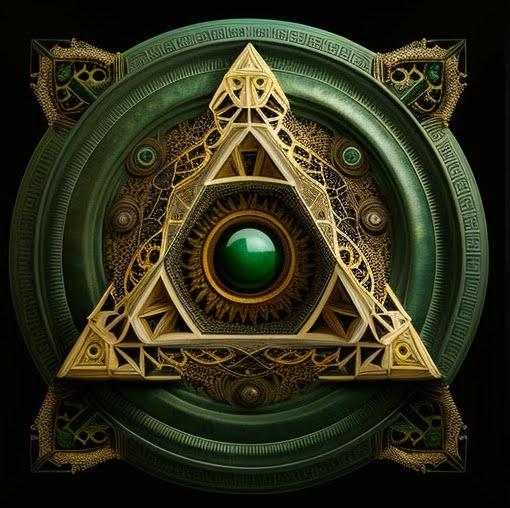 Salomé: Let me check. I think about 47 of them last I count. I didn’t insert the auto-generated ones, they were of lesser quality and seemed to interfere with the navigational array landing us always in expected places already travelled.
Salomé: Let me check. I think about 47 of them last I count. I didn’t insert the auto-generated ones, they were of lesser quality and seemed to interfere with the navigational array landing us always in expected places already travelled.Georges: Léonard has been missing for 4 months.
Salomé: you mean by our count, right?
Georges: Right. We need to find him to readjust or correct the navigational array. Jorid, give us statistical probabilities that we can use as clues to his current potential locations.
Jorid: Calculating statistical probabilities for Léonard’s location. It would be helpful to have more information, such as known destinations or areas of interest, to increase accuracy of probabilities.
Salomé: Jorid is in a lazy mood it seems. I preferred her more chatty.
Georges: You mean “him”, surely dear?
Salomé: (rolls eyes)
Georges: Anyway, Léonard seemed interested in archaeological finds in recent excavated tombs near the sand deserts of Bluhm’Oxl in the Zathu sector.
 Jorid: Analyzing data on archaeological finds near the sand deserts of Bluhm’Oxl in the Zathu sector. Probability of Léonard being in the area is calculated at 43%. Shall I plot a course to Bluhm’Oxl for further investigation?
Jorid: Analyzing data on archaeological finds near the sand deserts of Bluhm’Oxl in the Zathu sector. Probability of Léonard being in the area is calculated at 43%. Shall I plot a course to Bluhm’Oxl for further investigation?Salomé (loosing patience): Please engage your quantum capacities to access more data. We built you to be a bit more helpful than a bloody computer.
Georges laughed: I remembered you had more patience, dear!
Salomé: She’s in a mood today, isn’t she. What did you do to her?
Georges (cunningly): Jorid, sweet thing, please provide more details about the area, the populations, the customs the whole gamut dammit, and potential territorial conflicts in the vicinity. And be more chatty to please Salomé.
Jorid: Of course, I apologize for my previous responses. Analyzing data on the sand deserts of Bluhm’Oxl in the Zathu sector, including information on populations, customs, territorial conflicts and other relevant details. The area is known for its rich history and cultural heritage, with several ancient tombs and ruins attracting archaeological interest. The main population is composed of the Zathu nomads, known for their hospitality and trading skills. There are no known territorial conflicts in the area, but it is advised to exercise caution while traveling as the deserts can be treacherous.
Georges (laughs): You can’t stop her know!
Salomé (smiles noticing the “her”): Well, that doesn’t tell too much, does it. How shall we proceed? Need to synthetise some local clothes, or are you back to your thieving habits (pun intended)?
Georges: Haha, always ready for a good adventure. It seems we’ll have to do some research on the ground. As for the clothes, I’ll leave that to you my dear. Your sense of style never fails to impress. Let’s make sure to blend in with the locals and avoid drawing any unnecessary attention. The goal is to find Léonard, not get into trouble.
January 29, 2023 at 3:15 pm #6468In reply to: Orbs of Madjourneys
At the former Chinggis Khaan International Airport which was now called the New Ulaanbaatar International Airport, the young intern sat next to Youssef, making the seats tremble like a frail suspended bridge in the Andes. Youssef had been considering connecting to the game and start his quest to meet with his grumpy quirk, but the girl seemed pissed, almost on the brink of crying. So Youssef turned off his phone and asked her what had happened, without thinking about the consequences, and because he thought it was a nice opportunity to engage the conversation with her at last, and in doing so appear to be nice to care so that she might like him in return.
Natalie, because he had finally learned her name, started with all the bullying she had to endure from Miss Tartiflate during the trip, all the dismissal about her brilliant ideas, and how the Yeti only needed her to bring her coffee and pencils, and go fetch someone her boss needed to talk to, and how many time she would get no thanks, just a short: “you’re still here?”
After some time, Youssef even knew more about her parents and her sisters and their broken family dynamics than he would have cared to ask, even to be polite. At some point he was starting to feel grumpy and realised he hadn’t eaten since they arrived at the airport. But if he told Natalie he wanted to go get some food, she might follow him and get some too. His stomach growled like an angry bear. He stood more quickly than he wanted and his phone fell on the ground. The screen lit up and he could just catch a glimpse of a desert emoji in a notification before Natalie let out a squeal. Youssef looked around, people were glancing at him as if he might have been torturing her.
“Oh! Sorry, said Youssef. I just need to go to the bathroom before we board.”
“But the boarding is only in one hour!”
“Well I can’t wait one hour.”
“In that case I’m coming with you, I need to go there too anyway.”
“But someone needs to stay here for our bags,” said Youssef. He could have carried his own bag easily, but she had a small suitcase, a handbag and a backpack, and a few paper bags of products she bought at one of the two the duty free shops.
Natalie called Kyle and asked him to keep a close watch on her precious things. She might have been complaining about the boss, but she certainly had caught on a few traits of her.
Youssef was glad when the men’s bathroom door shut behind him and his ears could have some respite. A small Chinese business man was washing his hands at one of the sinks. He looked up at Youssef and seemed impressed by his height and muscles. The man asked for a selfie together so that he could show his friends how cool he was to have met such a big stranger in the airport bathroom. Youssef had learned it was easier to oblige them than having them follow him and insist.
When the man left, Youssef saw Natalie standing outside waiting for him. He thought it would have taken her longer. He only wanted to go get some food. Maybe if he took his time, she would go.

He remembered the game notification and turned on his phone. The icon was odd and kept shifting between four different landscapes, each barren and empty, with sand dunes stretching as far as the eye could see. One with a six legged camel was already intriguing, in the second one a strange arrowhead that seemed to be getting out of the desert sand reminded him of something that he couldn’t quite remember. The fourth one intrigued him the most, with that car in the middle of the desert and a boat coming out of a giant dune.
Still hungrumpy he nonetheless clicked on the shapeshifting icon and was taken to a new area in the game, where the ground was covered in sand and the sky was a deep orange, as if the sun was setting. He could see a mysterious figure in the distance, standing at the top of a sand dune.
The bell at the top right of the screen wobbled, signalling a message from the game. There were two. He opened the first one.
We’re excited to hear about your real-life parallel quest. It sounds like you’re getting close to uncovering the mystery of the grumpy shaman. Keep working on your blog website and keep an eye out for any clues that Xavier and the Snoot may send your way. We believe that you’re on the right path.
What on earth was that ? How did the game know about his life and the shaman at the oasis ? After the Thi Gang mess with THE BLOG he was becoming suspicious of those strange occurrences. He thought he could wonder for a long time or just enjoy the benefits. Apparently he had been granted a substantial reward in gold coins for successfully managing his first quest, along with a green potion.
He looked at his avatar who was roaming the desert with his pet bear (quite hungrumpy too). The avatar’s body was perfect, even the hands looked normal for once, but the outfit had those two silver disks that made him look like he was wearing an iron bra.

He opened the second message.
Clue unlocked It sounds like you’re in a remote location and disconnected from the game. But, your real-life experiences seem to be converging with your quest. The grumpy shaman you met at the food booth may hold the key to unlocking the next steps in the game. Remember, the desert represents your ability to adapt and navigate through difficult situations.
🏜️🧭🧙♂️ Explore the desert and see if the grumpy shaman’s clues lead you to the next steps in the game. Keep an open mind and pay attention to any symbols or clues that may help you in your quest. Remember, the desert represents your ability to adapt and navigate through difficult situations.
Youssef recalled that strange paper given by the lama shaman, was it another of the clues he needed to solve that game? He didn’t have time to think about it because a message bumped onto his screen.
“Need help? Contact me 👉”
Sands_of_time is trying to make contact : ➡️ACCEPT <> ➡️DENY ❓
January 19, 2023 at 10:49 am #6419In reply to: Orbs of Madjourneys
“I’d advise you not to take the parrot, Zara,” Harry the vet said, “There are restrictions on bringing dogs and other animals into state parks, and you can bet some jobsworth official will insist she stays in a cage at the very least.”
“Yeah, you’re right, I guess I’ll leave her here. I want to call in and see my cousin in Camden on the way to the airport in Sydney anyway. He has dozens of cats, I’d hate for anything to happen to Pretty Girl,” Zara replied.
“Is that the distant cousin you met when you were doing your family tree?” Harry asked, glancing up from the stitches he was removing from a wounded wombat. “There, he’s good to go. Give him a couple more days, then he can be released back where he came from.”
Zara smiled at Harry as she picked up the animal. “Yes! We haven’t met in person yet, and he’s going to show me the church my ancestor built. He says people have been spotting ghosts there lately, and there are rumours that it’s the ghost of the old convict Isaac who built it. If I can’t find photos of the ancestors, maybe I can get photos of their ghosts instead,” Zara said with a laugh.
“Good luck with that,” Harry replied raising an eyebrow. He liked Zara, she was quirkier than the others.
Zara hadn’t found it easy to research her mothers family from Bangalore in India, but her fathers English family had been easy enough. Although Zara had been born in England and emigrated to Australia in her late 20s, many of her ancestors siblings had emigrated over several generations, and Zara had managed to trace several down and made contact with a few of them. Isaac Stokes wasn’t a direct ancestor, he was the brother of her fourth great grandfather but his story had intrigued her. Sentenced to transportation for stealing tools for his work as a stonemason seemed to have worked in his favour. He built beautiful stone buildings in a tiny new town in the 1800s in the charming style of his home town in England.
Zara planned to stay in Camden for a couple of days before meeting the others at the Flying Fish Inn, anticipating a pleasant visit before the crazy adventure started.

Zara stepped down from the bus, squinting in the bright sunlight and looking around for her newfound cousin Bertie. A lanky middle aged man in dungarees and a red baseball cap came forward with his hand extended.
“Welcome to Camden, Zara I presume! Great to meet you!” he said shaking her hand and taking her rucksack. Zara was taken aback to see the family resemblance to her grandfather. So many scattered generations and yet there was still a thread of familiarity. “I bet you’re hungry, let’s go and get some tucker at Belle’s Cafe, and then I bet you want to see the church first, hey? Whoa, where’d that dang parrot come from?” Bertie said, ducking quickly as the bird swooped right in between them.
“Oh no, it’s Pretty Girl!” exclaimed Zara. “She wasn’t supposed to come with me, I didn’t bring her! How on earth did you fly all this way to get here the same time as me?” she asked the parrot.
“Pretty Girl has her ways, don’t forget to feed the parrot,” the bird replied with a squalk that resembled a mirthful guffaw.
“That’s one strange parrot you got here, girl!” Bertie said in astonishment.
“Well, seeing as you’re here now, Pretty Girl, you better come with us,” Zara said.
“Obviously,” replied Pretty Girl. It was hard to say for sure, but Zara was sure she detected an avian eye roll.

They sat outside under a sunshade to eat rather than cause any upset inside the cafe. Zara fancied an omelette but Pretty Girl objected, so she ordered hash browns instead and a fruit salad for the parrot. Bertie was a good sport about the strange talking bird after his initial surprise.
Bertie told her a bit about the ghost sightings, which had only started quite recently. They started when I started researching him, Zara thought to herself, almost as if he was reaching out. Her imagination was running riot already.

Bertie showed Zara around the church, a small building made of sandstone, but no ghost appeared in the bright heat of the afternoon. He took her on a little tour of Camden, once a tiny outpost but now a suburb of the city, pointing out all the original buildings, in particular the ones that Isaac had built. The church was walking distance of Bertie’s house and Zara decided to slip out and stroll over there after everyone had gone to bed.
Bertie had kindly allowed Pretty Girl to stay in the guest bedroom with her, safe from the cats, and Zara intended that the parrot stay in the room, but Pretty Girl was having none of it and insisted on joining her.
“Alright then, but no talking! I don’t want you scaring any ghost away so just keep a low profile!”
The moon was nearly full and it was a pleasant walk to the church. Pretty Girl fluttered from tree to tree along the sidewalk quietly. Enchanting aromas of exotic scented flowers wafted into her nostrils and Zara felt warmly relaxed and optimistic.
Zara was disappointed to find that the church was locked for the night, and realized with a sigh that she should have expected this to be the case. She wandered around the outside, trying to peer in the windows but there was nothing to be seen as the glass reflected the street lights. These things are not done in a hurry, she reminded herself, be patient.
Sitting under a tree on the grassy lawn attempting to open her mind to receiving ghostly communications (she wasn’t quite sure how to do that on purpose, any ghosts she’d seen previously had always been accidental and unexpected) Pretty Girl landed on her shoulder rather clumsily, pressing something hard and chill against her cheek.
“I told you to keep a low profile!” Zara hissed, as the parrot dropped the key into her lap. “Oh! is this the key to the church door?”
It was hard to see in the dim light but Zara was sure the parrot nodded, and was that another avian eye roll?
Zara walked slowly over the grass to the church door, tingling with anticipation. Pretty Girl hopped along the ground behind her. She turned the key in the lock and slowly pushed open the heavy door and walked inside and up the central aisle, looking around. And then she saw him.
Zara gasped. For a breif moment as the spectral wisps cleared, he looked almost solid. And she could see his tattoos.
“Oh my god,” she whispered, “It is really you. I recognize those tattoos from the description in the criminal registers. Some of them anyway, it seems you have a few more tats since you were transported.”
“Aye, I did that, wench. I were allays fond o’ me tats, does tha like ’em?”
He actually spoke to me! This was beyond Zara’s wildest hopes. Quick, ask him some questions!
“If you don’t mind me asking, Isaac, why did you lie about who your father was on your marriage register? I almost thought it wasn’t you, you know, that I had the wrong Isaac Stokes.”
A deafening rumbling laugh filled the building with echoes and the apparition dispersed in a labyrinthine swirl of tattood wisps.
“A story for another day,” whispered Zara, “Time to go back to Berties. Come on Pretty Girl. And put that key back where you found it.”
 October 19, 2022 at 6:46 am #6336
October 19, 2022 at 6:46 am #6336In reply to: Family Stories From The Other Side ~ Book Two
The Hamstall Ridware Connection
Stubbs and Woods
 Hamstall Ridware
Hamstall RidwareCharles Tomlinson‘s (1847-1907) wife Emma Grattidge (1853-1911) was born in Wolverhampton, the daughter and youngest child of William Grattidge (1820-1887) born in Foston, Derbyshire, and Mary Stubbs (1819-1880), born in Burton on Trent, daughter of Solomon Stubbs.
Solomon Stubbs (1781-1857) was born in Hamstall Ridware in 1781, the son of Samuel and Rebecca. Samuel Stubbs (1743-) and Rebecca Wood (1754-) married in 1769 in Darlaston. Samuel and Rebecca had six other children, all born in Darlaston. Sadly four of them died in infancy. Son John was born in 1779 in Darlaston and died two years later in Hamstall Ridware in 1781, the same year that Solomon was born there.
But why did they move to Hamstall Ridware?
Samuel Stubbs was born in 1743 in Curdworth, Warwickshire (near to Birmingham). I had made a mistake on the tree (along with all of the public trees on the Ancestry website) and had Rebecca Wood born in Cheddleton, Staffordshire. Rebecca Wood from Cheddleton was also born in 1843, the right age for the marriage. The Rebecca Wood born in Darlaston in 1754 seemed too young, at just fifteen years old at the time of the marriage. I couldn’t find any explanation for why a woman from Cheddleton would marry in Darlaston and then move to Hamstall Ridware. People didn’t usually move around much other than intermarriage with neighbouring villages, especially women. I had a closer look at the Darlaston Rebecca, and did a search on her father William Wood. I found his 1784 will online in which he mentions his daughter Rebecca, wife of Samuel Stubbs. Clearly the right Rebecca Wood was the one born in Darlaston, which made much more sense.
An excerpt from William Wood’s 1784 will mentioning daughter Rebecca married to Samuel Stubbs:

But why did they move to Hamstall Ridware circa 1780?
I had not intially noticed that Solomon Stubbs married again the year after his wife Phillis Lomas (1787-1844) died. Solomon married Charlotte Bell in 1845 in Burton on Trent and on the marriage register, Solomon’s father Samuel Stubbs occupation was mentioned: Samuel was a buckle maker.
Marriage of Solomon Stubbs and Charlotte Bell, father Samuel Stubbs buckle maker:

A rudimentary search on buckle making in the late 1700s provided a possible answer as to why Samuel and Rebecca left Darlaston in 1781. Shoe buckles had gone out of fashion, and by 1781 there were half as many buckle makers in Wolverhampton as there had been previously.
“Where there were 127 buckle makers at work in Wolverhampton, 68 in Bilston and 58 in Birmingham in 1770, their numbers had halved in 1781.”
via “historywebsite”(museum/metalware/steel)
Steel buckles had been the height of fashion, and the trade became enormous in Wolverhampton. Wolverhampton was a steel working town, renowned for its steel jewellery which was probably of many types. The trade directories show great numbers of “buckle makers”. Steel buckles were predominantly made in Wolverhampton: “from the late 1760s cut steel comes to the fore, from the thriving industry of the Wolverhampton area”. Bilston was also a great centre of buckle making, and other areas included Walsall. (It should be noted that Darlaston, Walsall, Bilston and Wolverhampton are all part of the same area)
In 1860, writing in defence of the Wolverhampton Art School, George Wallis talks about the cut steel industry in Wolverhampton. Referring to “the fine steel workers of the 17th and 18th centuries” he says: “Let them remember that 100 years ago [sc. c. 1760] a large trade existed with France and Spain in the fine steel goods of Birmingham and Wolverhampton, of which the latter were always allowed to be the best both in taste and workmanship. … A century ago French and Spanish merchants had their houses and agencies at Birmingham for the purchase of the steel goods of Wolverhampton…..The Great Revolution in France put an end to the demand for fine steel goods for a time and hostile tariffs finished what revolution began”.
The next search on buckle makers, Wolverhampton and Hamstall Ridware revealed an unexpected connecting link.
In Riotous Assemblies: Popular Protest in Hanoverian England by Adrian Randall:


In Walsall in 1750 on “Restoration Day” a crowd numbering 300 assembled, mostly buckle makers, singing Jacobite songs and other rebellious and riotous acts. The government was particularly worried about a curious meeting known as the “Jubilee” in Hamstall Ridware, which may have been part of a conspiracy for a Jacobite uprising.
But this was thirty years before Samuel and Rebecca moved to Hamstall Ridware and does not help to explain why they moved there around 1780, although it does suggest connecting links.
Rebecca’s father, William Wood, was a brickmaker. This was stated at the beginning of his will. On closer inspection of the will, he was a brickmaker who owned four acres of brick kilns, as well as dwelling houses, shops, barns, stables, a brewhouse, a malthouse, cattle and land.
A page from the 1784 will of William Wood:

The 1784 will of William Wood of Darlaston:
I William Wood the elder of Darlaston in the county of Stafford, brickmaker, being of sound and disposing mind memory and understanding (praised be to god for the same) do make publish and declare my last will and testament in manner and form following (that is to say) {after debts and funeral expense paid etc} I give to my loving wife Mary the use usage wear interest and enjoyment of all my goods chattels cattle stock in trade ~ money securities for money personal estate and effects whatsoever and wheresoever to hold unto her my said wife for and during the term of her natural life providing she so long continues my widow and unmarried and from or after her decease or intermarriage with any future husband which shall first happen.
Then I give all the said goods chattels cattle stock in trade money securites for money personal estate and effects unto my son Abraham Wood absolutely and forever. Also I give devise and bequeath unto my said wife Mary all that my messuages tenement or dwelling house together with the malthouse brewhouse barn stableyard garden and premises to the same belonging situate and being at Darlaston aforesaid and now in my own possession. Also all that messuage tenement or dwelling house together with the shop garden and premises with the appurtenances to the same ~ belonging situate in Darlaston aforesaid and now in the several holdings or occupation of George Knowles and Edward Knowles to hold the aforesaid premises and every part thereof with the appurtenances to my said wife Mary for and during the term of her natural life provided she so long continues my widow and unmarried. And from or after her decease or intermarriage with a future husband which shall first happen. Then I give and devise the aforesaid premises and every part thereof with the appurtenances unto my said son Abraham Wood his heirs and assigns forever.
Also I give unto my said wife all that piece or parcel of land or ground inclosed and taken out of Heath Field in the parish of Darlaston aforesaid containing four acres or thereabouts (be the same more or less) upon which my brick kilns erected and now in my own possession. To hold unto my said wife Mary until my said son Abraham attains his age of twenty one years if she so long continues my widow and unmarried as aforesaid and from and immediately after my said son Abraham attaining his age of twenty one years or my said wife marrying again as aforesaid which shall first happen then I give the said piece or parcel of land or ground and premises unto my said son Abraham his heirs and assigns forever.
And I do hereby charge all the aforesaid premises with the payment of the sum of twenty pounds a piece to each of my daughters namely Elizabeth the wife of Ambrose Dudall and Rebecca the wife of Samuel Stubbs which said sum of twenty pounds each I devise may be paid to them by my said son Abraham when and so soon as he attains his age of twenty one years provided always and my mind and will is that if my said son Abraham should happen to depart this life without leaving issue of his body lawfully begotten before he attains his age of twenty one years then I give and devise all the aforesaid premises and every part thereof with the appurtenances so given to my said son Abraham as aforesaid unto my said son William Wood and my said daughter Elizabeth Dudall and Rebecca Stubbs their heirs and assigns forever equally divided among them share and share alike as tenants in common and not as joint tenants. And lastly I do hereby nominate constitute and appoint my said wife Mary and my said son Abraham executrix and executor of this my will.
The marriage of William Wood (1725-1784) and Mary Clews (1715-1798) in 1749 was in Hamstall Ridware.

Mary was eleven years Williams senior, and it appears that they both came from Hamstall Ridware and moved to Darlaston after they married. Clearly Rebecca had extended family there (notwithstanding any possible connecting links between the Stubbs buckle makers of Darlaston and the Hamstall Ridware Jacobites thirty years prior). When the buckle trade collapsed in Darlaston, they likely moved to find employment elsewhere, perhaps with the help of Rebecca’s family.
I have not yet been able to find deaths recorded anywhere for either Samuel or Rebecca (there are a couple of deaths recorded for a Samuel Stubbs, one in 1809 in Wolverhampton, and one in 1810 in Birmingham but impossible to say which, if either, is the right one with the limited information, and difficult to know if they stayed in the Hamstall Ridware area or perhaps moved elsewhere)~ or find a reason for their son Solomon to be in Burton upon Trent, an evidently prosperous man with several properties including an earthenware business, as well as a land carrier business.
-
AuthorSearch Results